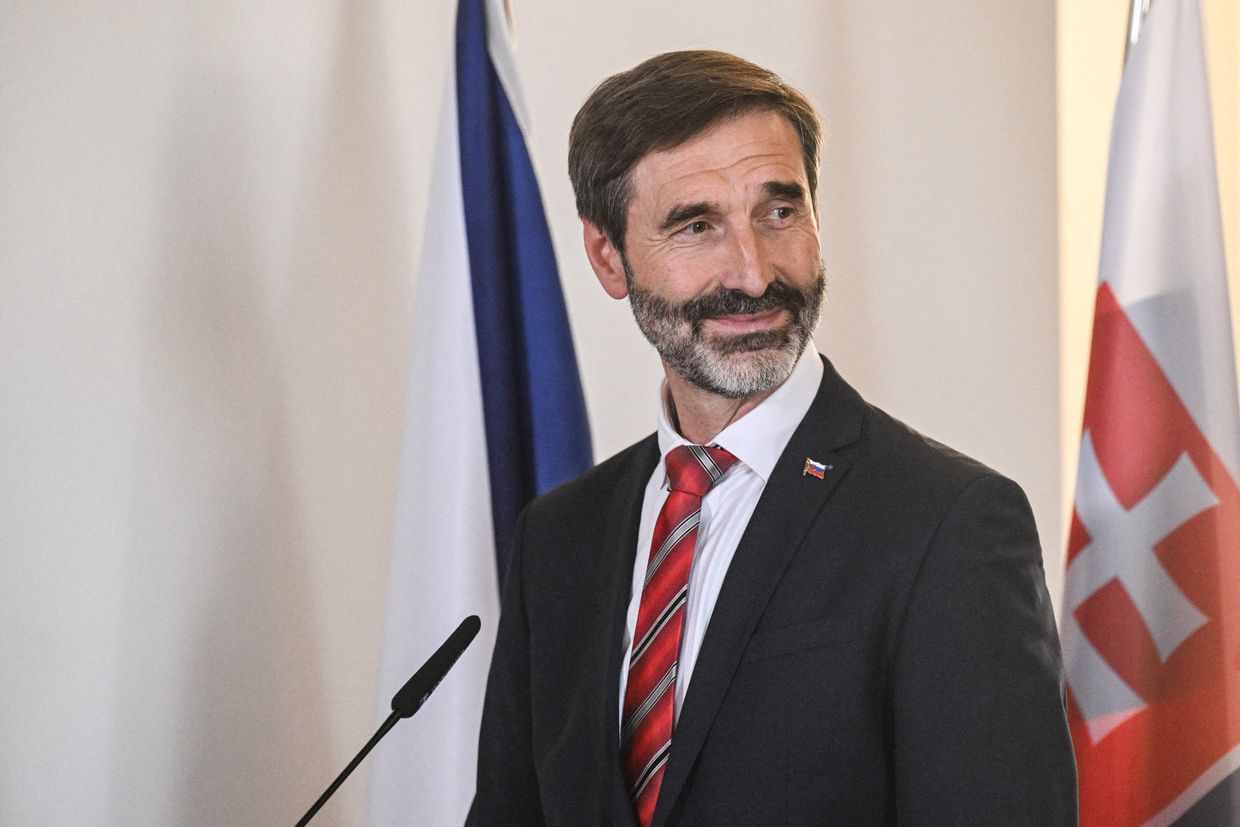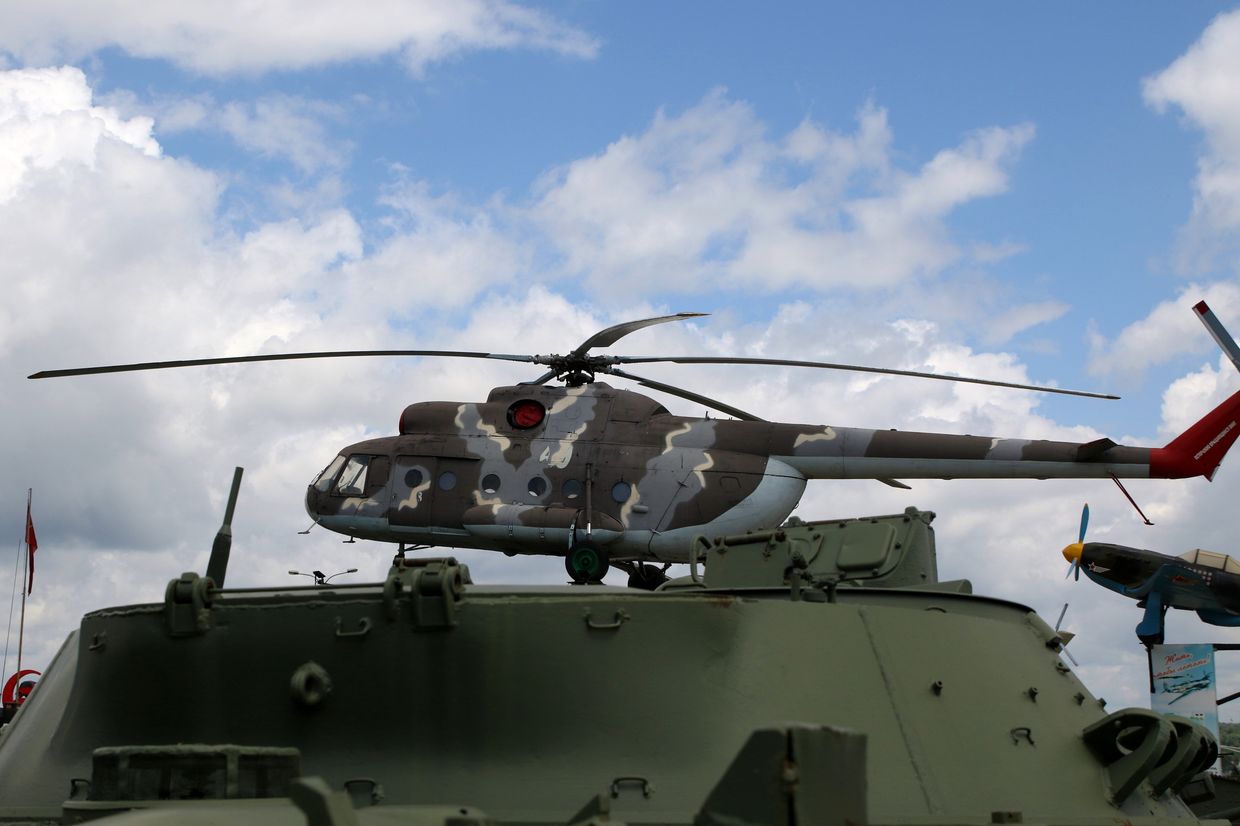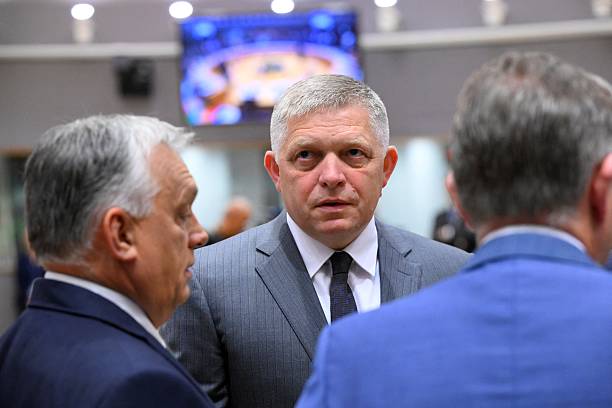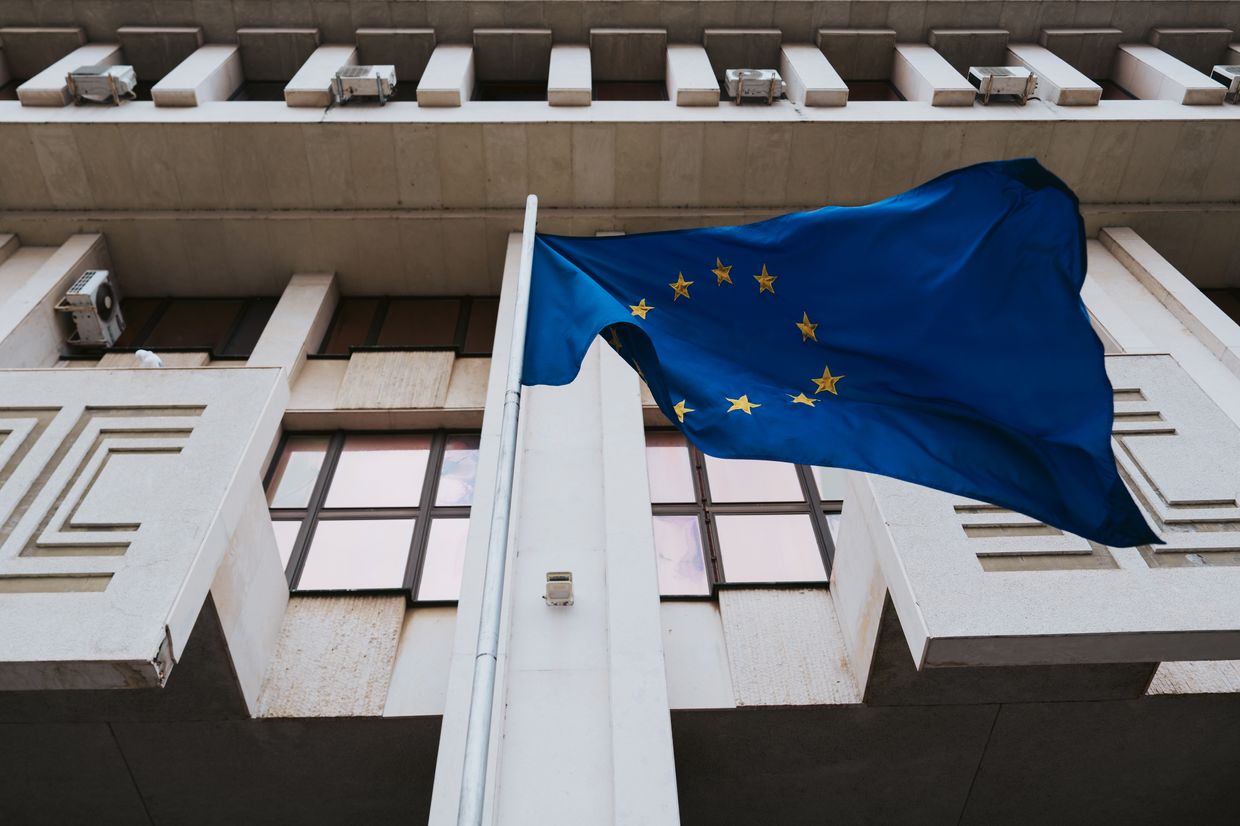This NATO defense minister tried to stop Russian propaganda. His country fell anyway
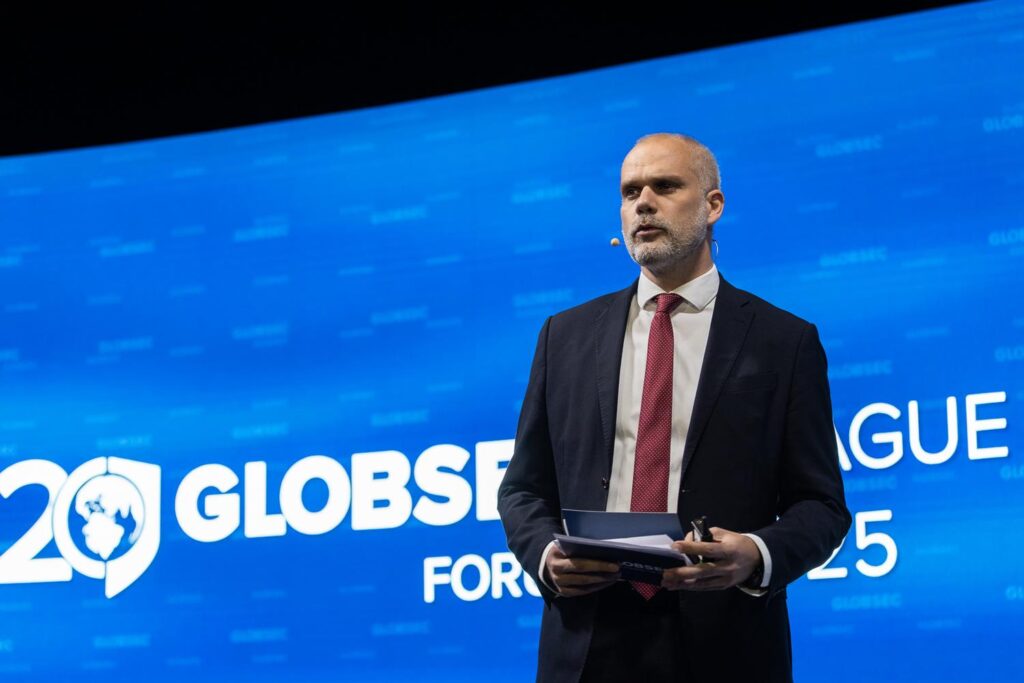
When Martin Sklenar served as Slovakia’s defense minister, his government did something unusual: they shut down Russian disinformation outlets spreading through Slovak society. The polls immediately shifted. Support for the Russian narrative dropped.
Then politics changed. The outlets returned. So did the pro-Russian sentiment.
It’s a real-time case study of how Russia captures Western democracies – with measurable results. Sklenar watched it happen from the inside.
Now Slovakia’s government, led by Robert Fico, pushes “peace” messaging that echoes Russian talking points. The country that once strongly supported Ukraine has flipped. And Sklenar, who served during the transition, knows exactly how Russia pulled it off.
“It’s incomprehensible that Slovaks would forget that in 1968 the Soviet Union invaded Slovakia,” he tells Euromaidan Press at the Globsec Forum in Prague. But it happened: Russia found another angle—focusing on the 1945 liberation instead of the 1968 invasion, claiming credit for the Red Army’s multinational sacrifice.
The formula works. Slovakia is proof. And Sklenar warns it’s spreading across Central Europe as populists promise to end the war quickly by giving Russia what it wants.
In our conversation, the former defense minister reveals the mechanics of Slovakia’s transformation, explains why European leaders hesitate to fully support Ukraine despite superior resources, and argues that Russia’s nuclear threats have become a paper tiger that nobody wants to test.
Russia used Minsk process ceasefire to advance war goals
EUROMAIDAN PRESS: Throughout this forum, a ceasefire has been discussed repeatedly as the best-case scenario for Ukraine. Is that your assessment?
SKLENAR: Ceasefire is only the first step. What we need is a justified and sustainable peace in Ukraine—the only thing that Ukraine deserves and the only thing that will actually stop the war.
However, a ceasefire seems to be a tool mostly for Russia to play with the political level of engagements, delaying any chance of action while allowing more time to produce weapons, deploy soldiers, and continue atrocities.
EUROMAIDAN PRESS: In 2015, we had a ceasefire negotiated, but it allowed Russia to rearm and attack with new vengeance. What prevents a ceasefire from becoming a new Minsk agreement?
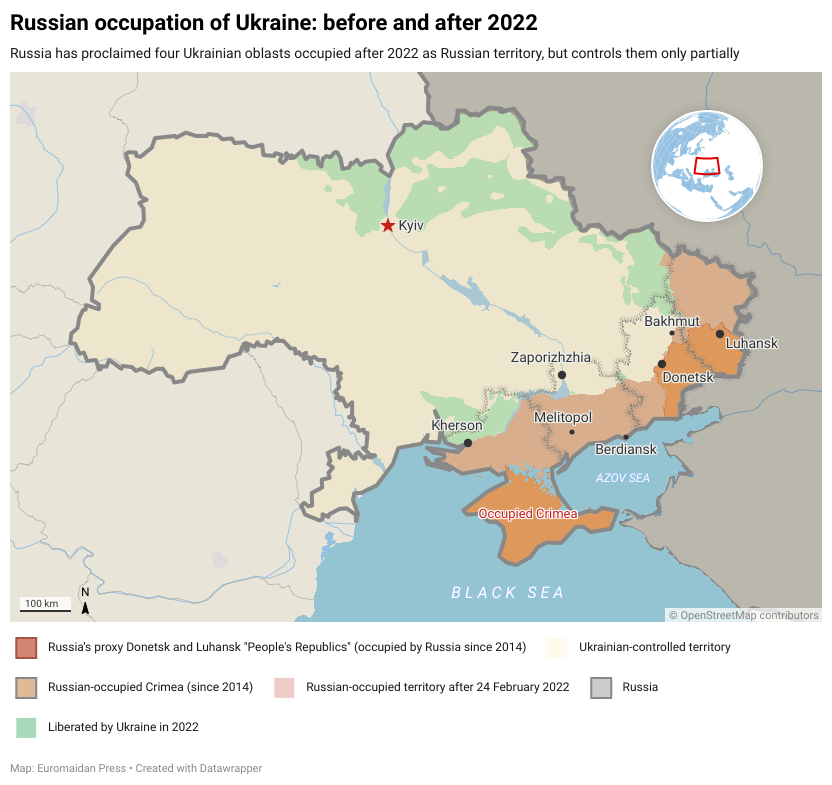
SKLENAR: The most difficult piece is making sure it’s not worth it for Russia to attack Ukraine. If we can do that, then Russia won’t start this again because it’s not worth it. You calculate the damages to your political reputation, international reputation, stability back home, economic situation, and the actual land you want to capture. Then you see if it’s worth it or not.
The main objective is to ensure that Russia doesn’t try again. This is difficult because the international political situation doesn’t seem aligned with reaching that solution. But we run the risk that if we allow Russia to seize territory, they’ll do this again when we can’t control it as well.
EUROMAIDAN PRESS: But that’s exactly what Russia gets from a ceasefire – control over Ukrainian territory.
SKLENAR: It depends. Ukraine is ready to start talking. Russia doesn’t want to start because they’d need to give away what they have now. The primary task is to continue supporting Ukraine so it can be stronger and have a stronger position as dialogue goes on, either directly with Russia or through mediators.
But even with a ceasefire, we’d need to monitor an area stretching a thousand kilometers, when the front is now 50 kilometers deep. That’s an incredible dimension. It’s so difficult to control every piece that striving for a ceasefire looks like a tactic to delay resolution.
That’s exactly what happened with Minsk. Russia uses so-called peace negotiations and ceasefires to advance war goals that include not only dominating Ukraine, but reversing all Eastern European NATO states.
EUROMAIDAN PRESS: One year ago, Zelenskyy’s peace plan was the number one idea. Now, Ukrainian Foreign Minister Sybiha talks about Trump’s plan as viable. Why has this rhetoric shifted?
SKLENAR: Trump’s arrival changed the situation. Last year, there was little optimism that negotiations could start. Now everybody talks about opportunities for negotiations. I’m disappointed personally, because we’ve given Russia another chance to play around with the West and delay the resolution of the conflict.
We’ve given Russia another chance to play around with the West and delay the resolution of the conflict.
Ukrainian representatives are in a difficult position—they must explore anything that could stop the war and liberate Ukraine. That involves President Trump, so you must work with the US administration. The US still plays a very important role in the world. And that’s why you need to adjust to the diplomacy. And with the diplomacy comes the rhetoric that you need to keep the US engaged.
It’s not just business deals but discussions that reflect the current situation. We saw what happened when President Zelensky visited the White House, if the rhetoric isn’t right. What you say should open possibilities to work closer and find solutions. If you don’t do that, you’re not even getting to the point where you discuss outcomes.
And if you are able to do that, that gives you some possibilities. If you don’t do that, then you are not even getting to the point where you are discussing some of the outcomes.
Foreign ministers are good at this, especially when your country has been at war for [eleven years].
EUROMAIDAN PRESS: What do we consider Ukrainian victory now?
SKLENAR: For Ukrainians, it’s clear. Victory is a situation where they can rely that Russia will not do this again. That requires strong commitment from Ukrainians, Europeans, the United States, Canada, Türkiye, and others – a strong enough relationship to ensure deterrence is strong enough that Russia’s post-war calculation tells them it’s not worth trying again.
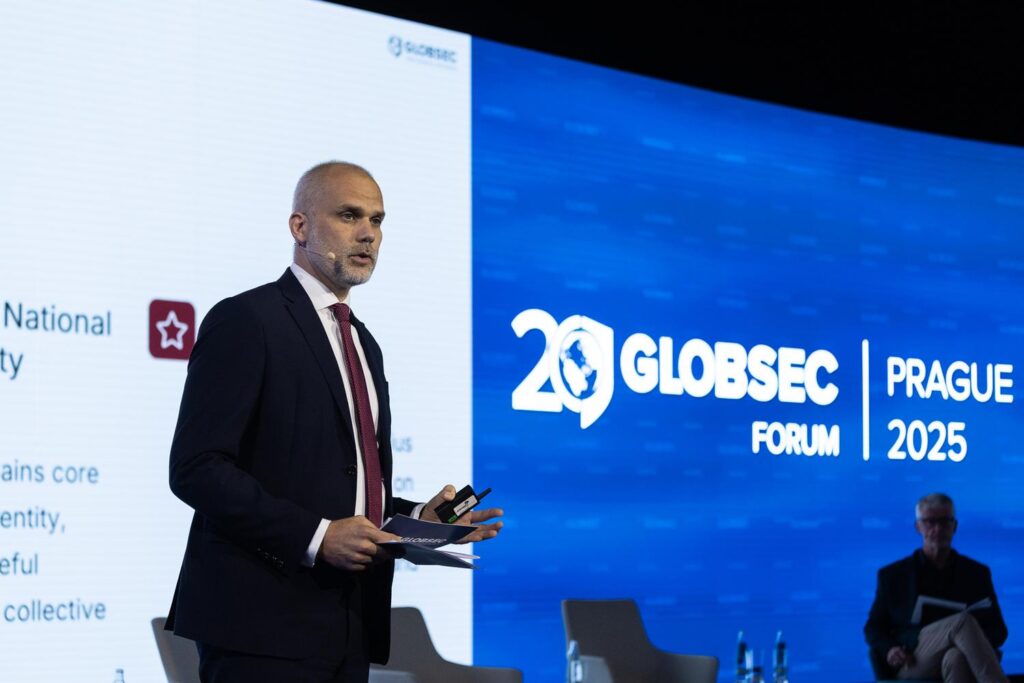
Slovakia’s flip towards Russia
EUROMAIDAN PRESS: You served in government during Slovakia’s transition from strong Ukraine support to Fico’s return with peace messaging. Why does the populist promise to end the war quickly resonate with voters who lived through the Soviet occupation?
SKLENAR: In Slovakia, the population is very polarized. We’ve been the object of strong Russian propaganda, polarizing society to where people don’t think about their experience but get influenced by disinformation campaigns targeted against them, questioning everything. This creates a complicated situation where everything and nothing seems true, which is easy to manipulate.
We’ve seen this trend for a long time. Previous governments tried to address it. When the full-scale invasion started in February 2022, there was a strong push toward limiting Russian influence in Slovak society, which unfortunately couldn’t continue due to political reasons.
What the government did was shut down some online outlets spreading disinformation. When that happened, we saw an immediate decrease in support for the Russian narrative. When there was no more political will to continue this, we saw an uptick again.
When Slovakia shut down outlets spreading disinformation, support for the Russian narrative decreased. When the political will ended, we saw an uptick again.
There’s a clear relationship between what’s coming into the country and population opinions. It’s not that Slovaks think one way or another—it’s still a polarized society with very small changes in support that, in the grand scheme, meant the government changed completely.
EUROMAIDAN PRESS: So, Russian propaganda is the reason for these changes that led to support for Fico?
SKLENAR: It’s a chicken and egg situation, but Prime Minister Fico is a very good politician who feels very well what the population can support. He can identify how to angle discussions to resonate with small, marginal groups. The main groups remain the same, but it depends on how much of the marginal groups you engage for election mobilization.
It’s incomprehensible that Slovaks would forget that in 1968, the Soviet Union and Warsaw Pact invaded Slovakia because it had a different opinion about how to run things. That’s a big national trauma the country still feels.
But now there’s another angle being used – not mentioning the 1968 invasion, but focusing on the liberation of Czechoslovakia in 1945 by the Red Army, which the Russian Federation now claims all responsibility for, even though it was Ukrainians and other nationalities who served in the Red Army and helped liberate Slovakia.
That’s overlooked, and it comes back to misinterpreted history during socialist times. After the Slovak national uprising against the fascist regime in 1944-45, before the war’s end, when the Communist Party took over in 1948, they reconstructed historical facts and connotations in favor of the socialist regime.
That resonates with older populations and creates situations where you have multiple versions of the same events. In a world where truth has been relativized, you can choose which version you believe.
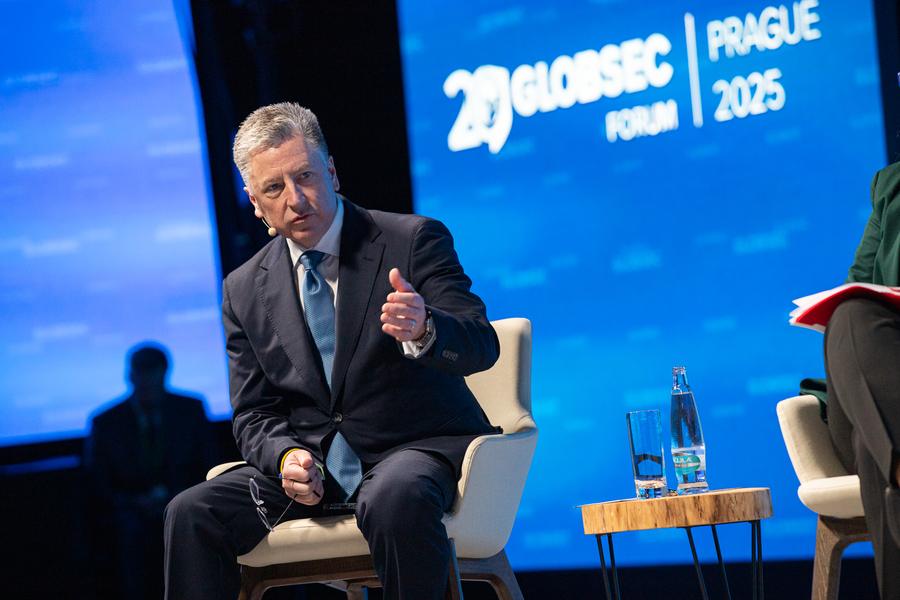
Frozen conflict Ukraine’s “best case scenario” because Russia has nukes, Kurt Volker says
Social media becomes a battlefield
EUROMAIDAN PRESS: What actions in Slovakia were useful to limit the spread of disinformation?
SKLENAR: Taking down outlets that spread disinformation was most effective, but there’s only so much a country can do. Most people now consume news and opinions they want to believe on social media.
The straightforward way to handle this is through dialogue with social media platforms and media generally, ensuring the professionalism we expect. We grew up when news were produced by professional journalists who studied how to make news objective and provide a picture for people to form their own opinions.
Now this has gone away. People don’t distinguish between professional journalists and people sharing opinions on social media. That should change through media literacy, education, and analytical thinking required to understand what’s being pushed at you and that you’re being targeted.
If propaganda is part of war—as General Gerasimov told us in 2007 when he proposed what we call the hybrid warfare doctrine, saying that whether it’s peacetime or crisis, Russia will always conduct information operations to advance its objectives—then this has been going on forever.
This is a general talking about military operations in the information space all the time. Social media becomes a battlefield, but people don’t perceive it that way.
Social media becomes a battlefield, but people don’t perceive it that way.
If people want to join the military, they think about risks and rewards—I earn money and have a stable job, but if situations deteriorate, I might end up fighting for my country. You make an informed decision.
Сreating a social media profile, you don’t think you’re joining a battlefield. Yet every time you log in, you become a soldier. You could choose to be on the good side or bad side, or stay indifferent and be the target in the middle.
People should understand: if you’re here, this is an information space where the battlefield reaches. Make your own assessment of how you want to deal with it.
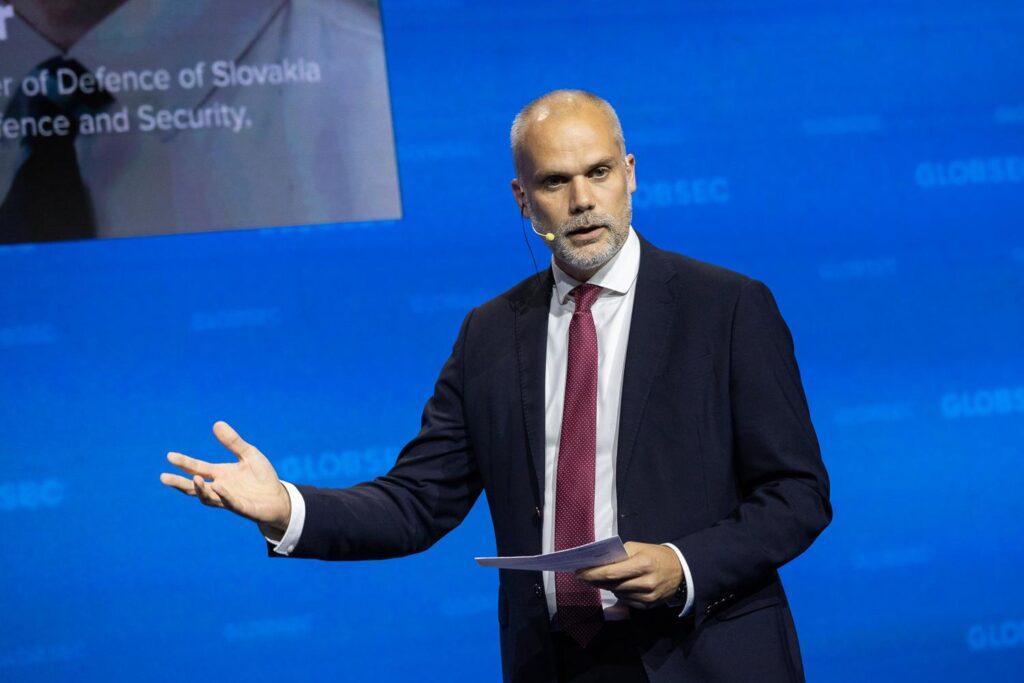
EUROMAIDAN PRESS: What’s the number one reason preventing the West from ensuring Ukraine’s victory?
SKLENAR: The false perception of peace in Europe. Sometimes we say Ukraine is far from Paris, Madrid, or Rome, so it’s not as urgent as in Baltic countries or Poland, which border Russia and know what might happen.
But populations in these countries feel very secure and normal. Even here in Prague—it’s beautiful—there are no signs Russia is at war with Europe.
And Russians are telling us they are [at war]. They assign us objectives that we’re an enemy country. They push propaganda. They make their influence. They send their shadow fleet across the Baltic Sea, seeing whether something bad happens, they might use as a pretext for escalation.
They’re attacking us in this way. In one panel, we discussed how Russia attacks NATO members in this hybrid, below-the-threshold way. But people don’t feel like it. If it’s below the threshold, people think it’ll be fine—maybe a little discomfort, and there should be people watching to know if it gets worse. But right now it’s fine and we live as we used to.
In Europe, this means social benefits and money spent having a great time. With that comes a lack of interest and support for difficult political decisions about supporting Ukraine to the necessary level. Politicians who push too hard without popular support lose elections.
We risk getting more representatives like in Slovakia’s case, who come into important positions doing even less. That’s difficult for Ukraine when there’s no end to the war in sight and negotiations haven’t even started.
It’s this perception of peace in Europe despite us being in deep trouble.
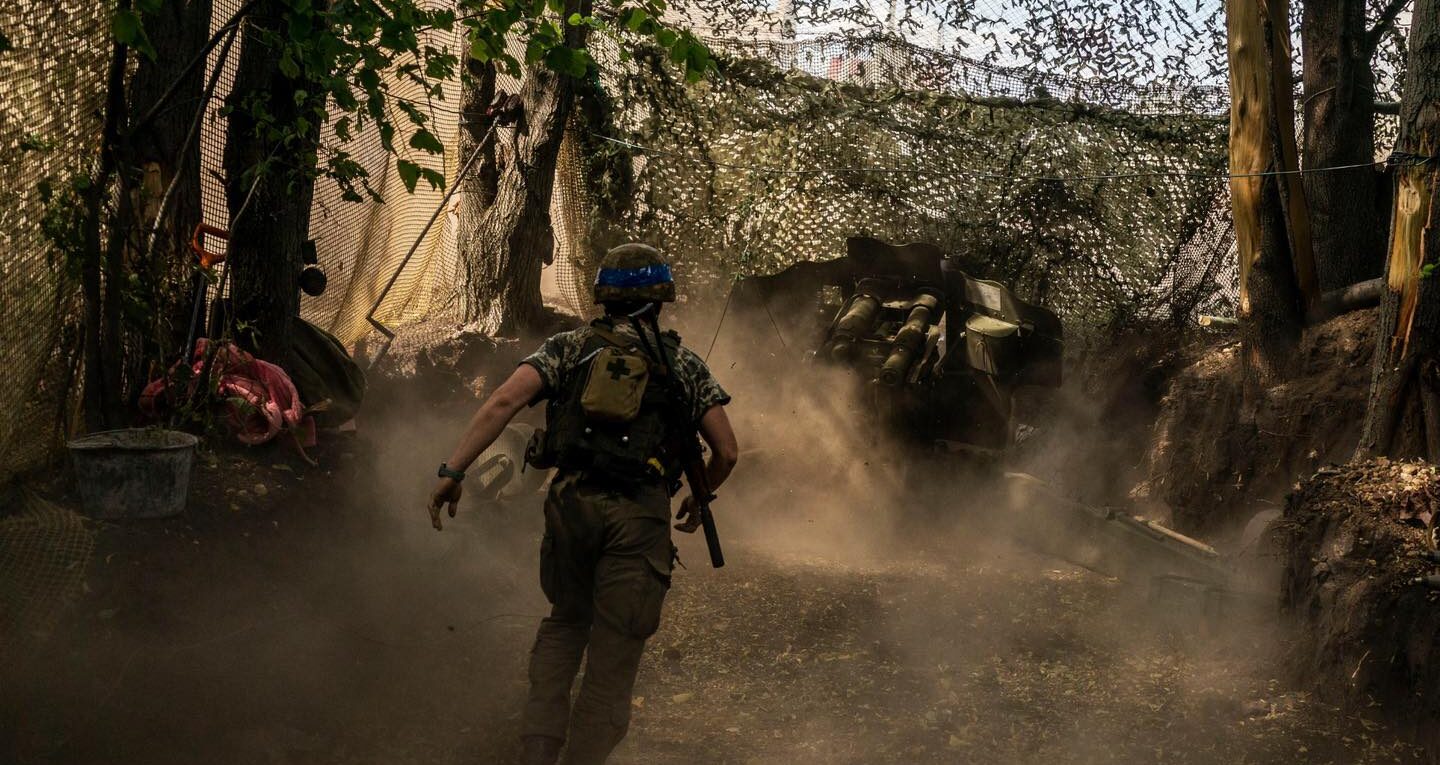
GLOBSEC mapped seven Ukraine war scenarios through 2026. Even the “best case” spells future disaster.
Explaining the level of support that Ukraine needs is difficult
EUROMAIDAN PRESS: Romanian former NATO spokeswoman Lungescu just said there’s been no Russian attack on NATO members– despite Russian drones regularly falling on Romanian soil—and no war in Europe, despite Ukraine being at war. Who can make the difficult decisions, if politicians are bound by the population’s will, and populists exploit this?
SKLENAR: These decisions are still being taken. Many governments decide despite a lack of support – I don’t think any country has ever had resolute support for donating military equipment to Ukraine. That would be hard to imagine in any context.
But to ensure Ukraine negotiates from strength requires much more support. The level of increase necessary is difficult to explain to populations.
Politicians don’t need to make all decisions at once, but they must explain and raise awareness about what’s at stake. It’s not only Ukraine—it’s ordinary citizens’ way of life at stake.
We hear Russia could be ready to test NATO and the EU in two to five years. Two years could happen at any time. Whenever there’s an opportunity, Russia might use it. Just recently, we heard news about Israel attacking Iran. Just like that, it could be news about Russia challenging NATO and EU unity in the Baltics, Romania, or anywhere else.
Discussion about West’s use of nuclear weapons needed
EUROMAIDAN PRESS: Russian nuclear weapons appear to be Russia’s strongest deterrent because Western nations submit to Russia’s red lines. But Ukraine violates these red lines daily. Do you see this changing? Do you see this dynamic changing, or are we stuck with nuclear paralysis indefinitely?
SKLENAR: That’s the most difficult discussion to have because the weapons are so horrifying that even the slightest possibility of them being used is seen as most extreme; you don’t want to play with that situation at all.
We haven’t chosen this situation. This is Putin deciding to put everybody in an uncomfortable situation and do this as long as necessary to break their will and do as he feels like doing.
Despite expectations that Russia might use weapons or signal their use, we’ve seen both horizontal and vertical escalation from Russia’s side, then balancing from the Western side.
“If you deliver F-16s to Ukraine, you will see a response from Russia, and we will not shy away from using nuclear weapons to protect our territory.” Yet the F-16s are in Ukraine; they’re flying, nothing has happened.
“Ukraine cannot target targets in Russia. Otherwise, it will mean use of nuclear weapons.” This has not happened. So Russian rhetoric is… I don’t want to say inconsistent, and don’t want to say they don’t really mean it. This is exactly the situation where you cannot take it out of the equation.

But just as drones represent the change in how modern warfare is fought, we see discussions about the role of modern technology versus traditional military equipment. I think we’ll need a discussion about what role nuclear weapons can actually achieve in a conflict like this very soon—what it means and why we have nuclear weapons if in situations where they should be used, they’re not even being signaled to be used.
West does not benefit from war against Ukraine
EUROMAIDAN PRESS: Cynical voices say the West benefits from this war – Russia is using Soviet-era stock artillery to kill Ukrainians instead of attacking NATO countries. Is the West buying time with Ukrainian blood?
SKLENAR: No. The West is not benefiting. Ukraine has chosen to be part of the West. Now we know we didn’t do enough before the invasion to bring Ukraine into NATO. If we were in a similar situation now, we’d ensure Ukraine is protected by Article 5.
When this is over—not if but when—Ukraine will become part of the West. So the West is losing. Every citizen in Ukraine killed is a loss for the West.
The West recognizes that Ukraine is fighting a war for the whole Western community against Russia. If Ukraine were a NATO member, this would be much simpler. That’s what’s so attractive about being a NATO or EU member—you have basic arrangements with countries you can rely on. Ukraine is in a challenging situation because we weren’t quick enough or we didn’t believe Russia would actually do this.
We put them in this unfortunate situation. But with the support, we’re trying to help.

Thanks to your incredible support, we’ve raised 70% of our funding goal to launch a platform connecting Ukraine’s defense tech with the world – David vs. Goliath defense blog. It will support Ukrainian engineers who are creating innovative battlefield solutions and we are inviting you to join us on the journey.
Our platform will showcase the Ukrainian defense tech underdogs who are Ukraine’s hope to win in the war against Russia, giving them the much-needed visibility to connect them with crucial expertise, funding, and international support.
We’re one final push away from making this platform a reality.
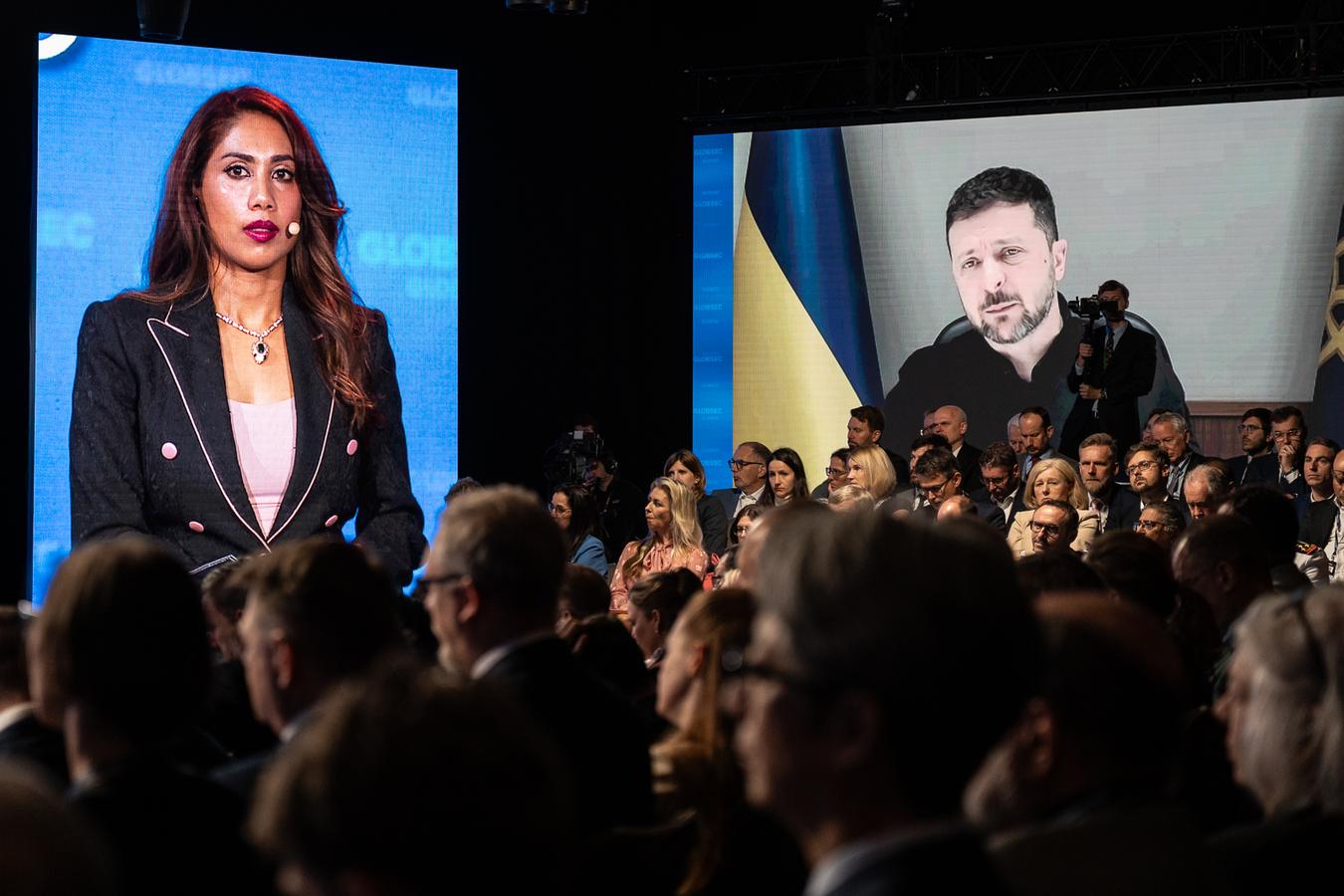

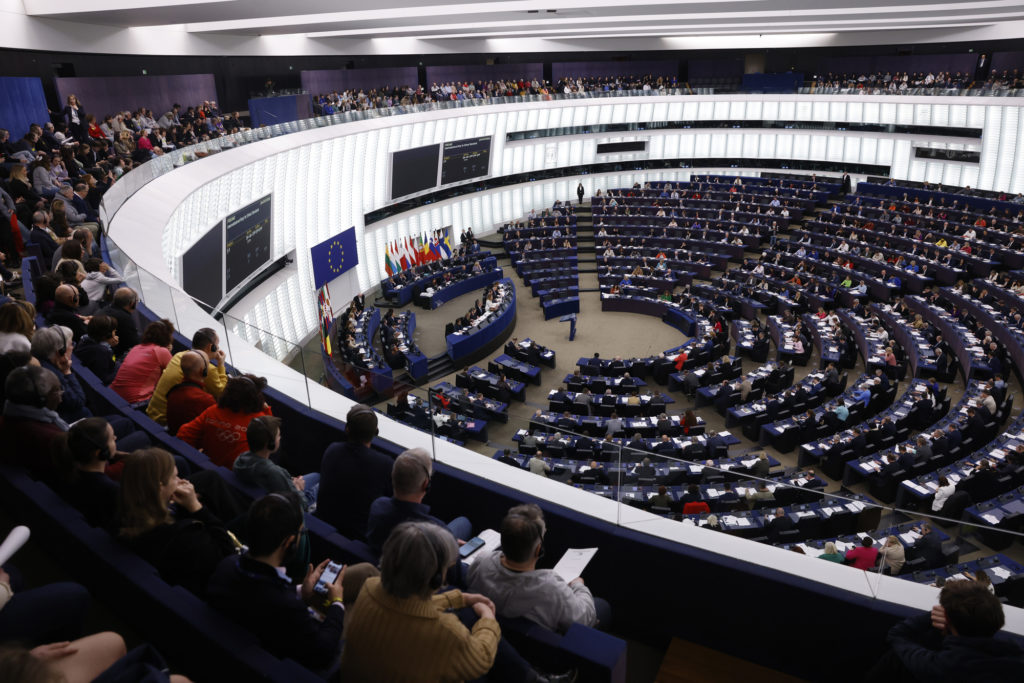
 ambassadors. They may return to the issue on Friday,”
ambassadors. They may return to the issue on Friday,” 